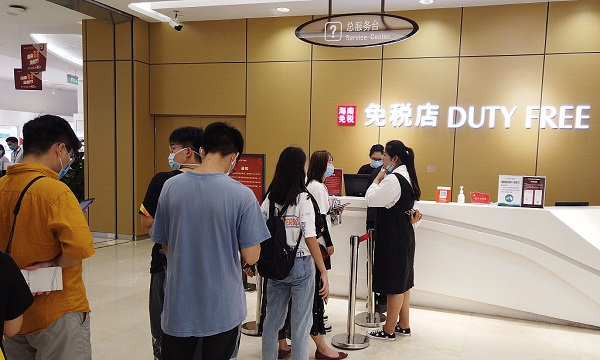
A duty-free shop in South China's Hainan, on June 25, 2020. [Photo/VCG]
I have visited Hainan province many times for either leisure travel or work. On every occasion, I made it a point to visit the local duty-free shopping malls. Such is the allure of their lower prices (relative to other Chinese mainland cities) that I invariably end up buying something or another. Else, I'd be overcome with a sense of loss.
A confession like that comes without the fear of being perceived as a shopaholic as I know for certain I'm not alone in this context. Many others, especially young female consumers, have admitted that Hainan's duty-free shops are irresistible.
This trend has spurred the vitality of the offshore duty-free shopping business in Hainan, which has become a golden signboard of local tourism consumption. Affected by the COVID-19 pandemic, the market experienced a slight downturn in 2022. But, since then, it has seen a rapid recovery after China optimized its pandemic response measures in late 2022.
In the January-November period of 2023, total sales revenue of duty-free products in Hainan reached nearly 41 billion yuan ($5.7 billion), up 26 percent year-on-year. During the period, 6.23 million shoppers made purchases, growing 60 percent year-on-year, according to Haikou Customs.
Last year, the provincial capital Haikou and tropical city Sanya repeatedly issued duty-free shopping vouchers to stimulate the shopping enthusiasm of tourists visiting the island.
The year-end and various other holidays that follow are traditionally a busy season for shopping in Hainan. Duty-free stores recently launched a range of promotional activities, including new products, experiences, discounts and lucky draws.
By 2025, Hainan is expected to be built into a free trade port. That has already helped the province to attract more businesses. With more high-quality goods on offer, luxury consumption is expected to grow rapidly in Hainan, said a research report of Guotai Junan Securities.
Louis Vuitton launched its new boutique at the second phase of the duty-free shopping complex in Haitang Bay, Sanya, in late October. The store, which uses the taxable business model, attracted droves of consumers on its opening day.
Meanwhile, two key construction projects in Hainan — the expansion of the third phase of Sanya Phoenix International Airport and the expansion of Qionghai Boao Airport — started in late November. The projects are foreseen to help guarantee the rapid growth of the island's air travel market.
As Hainan is set to become an entire duty-free island by 2025, it is poised to grow as a bright luxury hub, and Chinese consumers have fueled the Asian luxury ecosystem, said consultancy Bain & Co.
"Looking ahead to 2030, solid fundamentals are poised to continue to drive market growth, despite possible bumps along the route. Chinese customers will account for 35 percent to 40 percent of the personal luxury goods market, while Europeans and Americans together will represent 40 percent," said Claudia D'Arpizio, a Bain & Co partner.